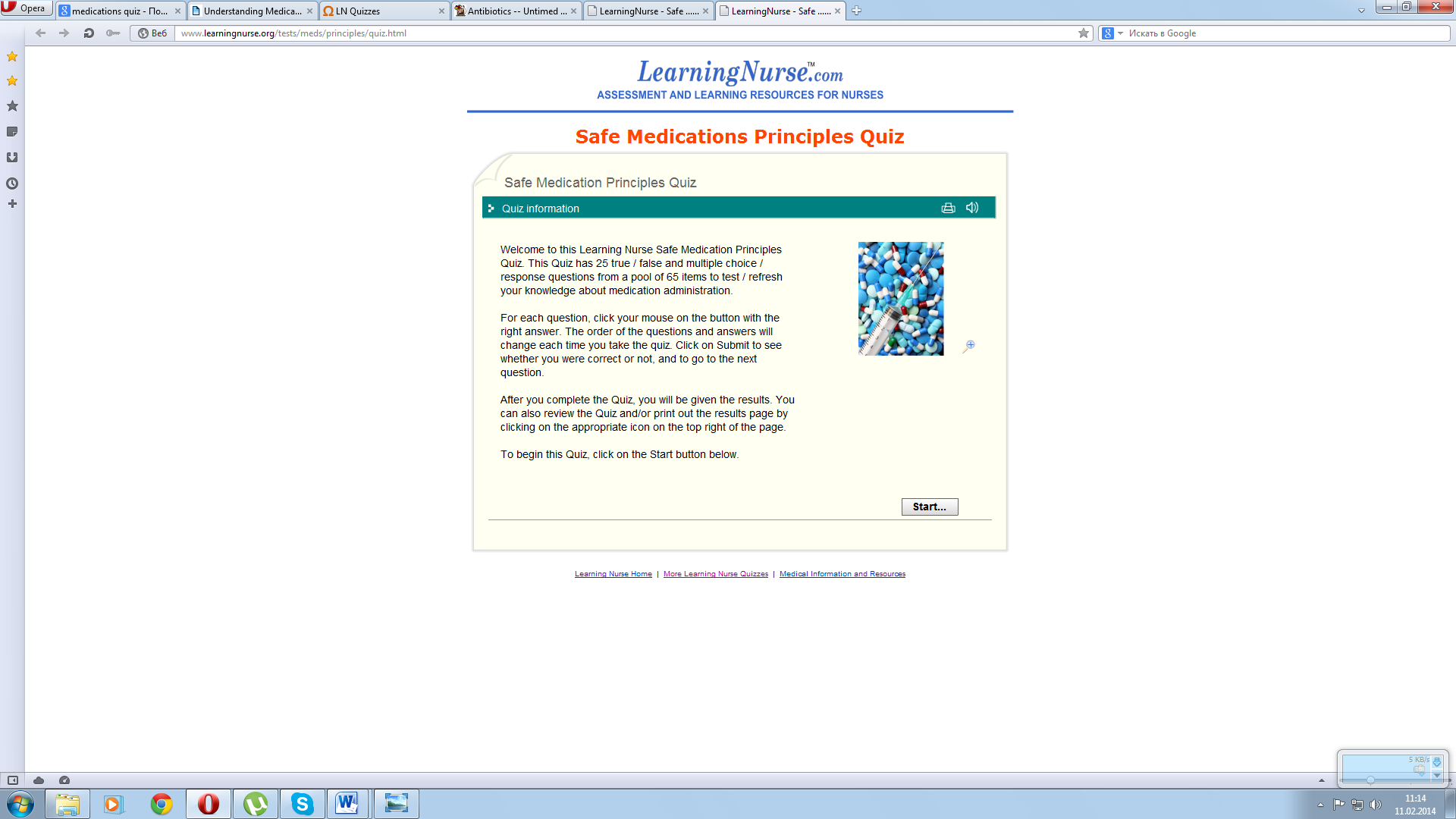- Преподавателю
- Иностранные языки
- Учебное пособие для студентов по дисциплине «Иностранный язык» «Основные лекарственные средства»
Учебное пособие для студентов по дисциплине «Иностранный язык» «Основные лекарственные средства»
| Раздел | Иностранные языки |
| Класс | - |
| Тип | Другие методич. материалы |
| Автор | Анохина С.О. |
| Дата | 09.01.2014 |
| Формат | docx |
| Изображения | Есть |
краевое государственное бюджетное образовательное учреждение
среднего профессионального образования
«Ачинский медицинский техникум»
(КГБОУСПО АМТ)
Учебное пособие для студентов
по дисциплине «Иностранный язык»
Basic Medicines
Основные лекарственные средства
для специальности
060101Лечебное дело
Ачинск, 2014
РАССМОТРЕНО
на заседании ПЦК ОГСЭ и ЕН дисциплин
Председатель ПЦК
____________ И.М. Фадеева
Протокол №____ «____»_______________ 2014 г.
Председатель Фадеева И.М.
УТВЕРЖДАЮ
Зам. директора по НМР
______________ С.П. Бабина «____»___________ 2014 г.
Автор-составитель:
Анохина С.О., преподаватель иностранного языка I квалификационной категории КГБОУСПО АМТ.
Рецензенты:
Таранова Т.Ю., преподаватель иностранного языка высшей квалификационной категории КГБОУСПО АМТ.
Фадеева И.М., председатель ПЦК ОГСЭ и ЕН дисциплин КГБОУСПО АМТ.
Содержание:
-
Введение 4 стр.
-
Основная часть 5-10стр.
-
Заключение 11стр.
-
Библиографический список 12стр.
-
Приложения 13-14 стр.
Введение
Данная методическая разработка для студентов соответствует требованиям ФГОС СПО по специальности 060101 Лечебное дело (углубленный уровень среднего профессионального образования).
Она предназначена для студентов 2 курса специальности 060101 Лечебное дело и призвана помочь в овладении темы программы «Основные лекарственные средства».
Преподаватель имеет возможность выборочно использовать предложенные упражнения на занятия, а также предложить студентам материал для самостоятельного изучения с целью закрепления ранее изученного, пополнения словарного запаса, развития навыков аудирования и работы с текстом, извлечения нужной информации, ликвидации пробелов в случае отсутствия студента на занятии.
Методическая разработка содержит грамматический материал с упражнениями, текст по теме, аудиоматериал, мультимедийные презентации, лексический материал и лексические упражнения с учетом специализации, упражнения на развитие навыков устной речи и аудирования, тестовые задания по теме.
BASIC PART
-
Guess the meanings of the words of Latin and Greek origin:
the ampule, the antibiotic, the suppository, the tablets, the vitamin, the pills, the chemist, aspirin, paracetamol.
2.Study the pictures and remember these words:
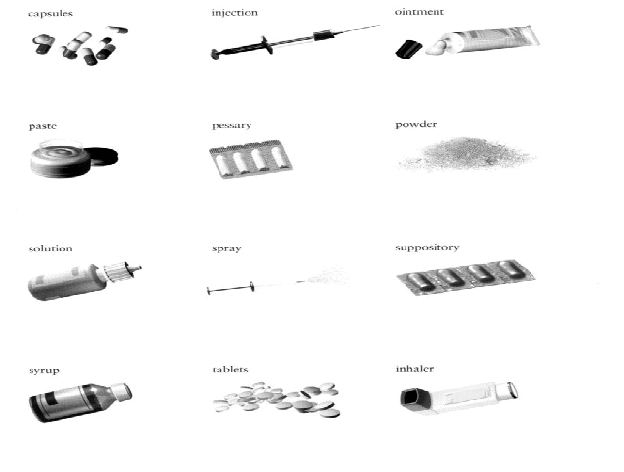
3. Match column A to column B:
-
the safe use of medication
-
to dispense medications
-
Pharmacology
-
Pharmacist
-
drug information
-
painkillers
-
ointment
-
suppository
-
laxative
10.sedative
a.болеутоляющее
b.фармакология
c.слабительное
d.безопасное применение лекарств
e.приготовлять и распределять лекарства
f.успокоительное
g.мазь
h.свечи
i.фармацевт
j.информация о лекарстве
4.Study the flash cardsand name the basic medicines.( Приложение )
5.Watch PPT and answer the questions:
(Приложение 1)
1.What Are medicines?
2. What are the sources of medicines?
3. What ways can the medications be delivered in ?
4. What type of medicine does bacterial infections fights?
5. What medicine are designed to relieve pain?
6. What types of medicine do protect the body against certain infectious diseases?
6. Listen to the text. (Приложения 2-3)
What Are Medicines?
Medicines are chemicals or compounds used to cure, halt, or prevent disease; ease symptoms; or help in the diagnosis of certain illnesses. Advances in medications have enabled doctors to cure many diseases and save lives.
These days, medicines come from a variety of sources. Many were developed from substances found in nature, and even today many are extracted from plants. For example, one medicine that is used to treat certain cancers comes from the Pacific yew tree.
Some medicines are produced in a laboratory by mixing together a number of chemicals. Others, like penicillin, are byproducts of organisms such as fungus. And a few medicines are even biologically engineered by inserting genes into bacteria that make them produce the desired substance.
When we think about taking medications, we often think of pills. But medications can be delivered in many ways, such as:
liquids that are swallowed (like cough syrup)
drops that are put into ears or eyes
creams, gels, or ointments that are rubbed onto the skin
inhalers (like nasal sprays or asthma inhalers)
patches that are stuck to skin (called transdermal patches)
tablets that are placed under the tongue (called sublingual medicines; the medication is absorbed into blood vessels and enters the bloodstream)
injections (shots) or intravenous (inserted into a vein) medications
No medicine can be sold unless it has first been approved by the U.S. Food and Drug Administration (FDA). The manufacturers of the medication perform tests on all new medicines and send the results to the FDA.
The FDA allows new medicines to be used only if they work and if they are safe enough. When a medicine's benefits outweigh its known risks, the FDA usually approves the sale of the drug. The FDA can withdraw a medication from the market at any time if it later is found to cause harmful side effects.
Different Types of Medicines
Medicines act in a variety of ways. Some can cure an illness by killing or halting the spread of invading germs, such as bacteria and viruses. Others are used to treat cancer by killing cells as they divide or preventing them from multiplying. Some drugs simply replace missing substances or correct abnormally low levels of natural body chemicals such as certain hormones or vitamins. Medicines can even affect parts of the nervous system that control a particular body process.
Nearly everyone has taken an antibiotic. This type of medicine fights bacterial infections. Your doctor may prescribe an antibiotic for things like strep throat or an ear infection. Antibiotics work either by killing bacteria or halting their multiplication so that the body's immune system can fight off the infection.
Sometimes a part of the body can't produce enough of a certain chemical. That can also make you sick. Someone with insulin-dependent diabetes, for instance, has a pancreas that can't produce enough insulin (a hormone that regulates glucose in the body). Some people have a low production of thyroid hormone, which helps control how the body uses energy. In each case, doctors can prescribe medicines to replace the missing hormone.
Some medicines treat symptoms but can't cure the illness that causes the symptoms. (A symptom is anything you feel while you're sick, such as a cough or nausea.) So taking a lozenge may soothe a sore throat, but it won't kill that nasty strep bacteria.
Certain medicines are designed to relieve pain. If you pull a muscle, your doctor might tell you to take ibuprofen or acetaminophen. These pain relievers, or analgesics, don't get rid of the source of the pain - your muscle will still be pulled. What they do is block the pathways that transmit pain signals from the injured or irritated body part to the brain (in other words, they affect the way the brain reads the pain signal) so that you don't hurt as much while your body recovers.
As people get older, they sometimes develop chronic or long-term conditions. Medicines can help control certain conditions like high blood pressure (hypertension) or high cholesterol. These drugs don't provide a cure for the underlying problem, but they can help prevent some of the body-damaging effects of the disease or condition over time.
Among the most important medicines are immunizations (or vaccines). These keep people from getting sick in the first place by immunizing, or protecting, the body against certain infectious diseases. Vaccines usually contain a small amount of an agent that resembles a specific germ or germs that have been modified or killed. When someone is vaccinated, it primes the body's immune system to "remember" the germ so it will be able to fight off infection by that germ in the future.
Most immunizations that prevent you from catching diseases like measles, whooping cough, and chickenpox are given by injection. No one thinks shots are fun. But the diseases they prevent can be very serious and cause symptoms that last much longer than the temporary discomfort of the shot.
Although some medications require a prescription, some are available in stores. For example, many medications for pain, fever, cough, or allergies can be purchased without a prescription. But just because a medicine is available over-the-counter (OTC), that doesn't mean it's free of side effects. Take OTC medicines with the same caution as those prescribed by a doctor.
Taking Medicines
No matter what type of medicine your doctor prescribes, it's always important to be safe and follow some basic rules:
If you feel worse after taking a medicine, tell your doctor right away.
Double-check that you have the right medicine. If you get the same prescription filled more than once, check that it's the same shape, size, and color as the last time. If not, be sure to ask the pharmacist about it.
Read the label and follow directions. Ask if you have questions.
Take medicines exactly as prescribed. If the instructions say take one tablet four times a day, don't take two tablets twice a day. It's not the same.
Ask if the medicine is likely to affect everyday tasks such as driving or concentrating in school.
Don't take more medication than is recommended. It won't make you heal faster or feel better quicker. In fact, an overdose of medication can make you sick.
Always follow your doctor's or pharmacist's instructions. For instance, he or she may tell you to take a medicine with food to help lessen the stomach upset it can cause or instead to take the medicine on an empty stomach so as not to interfere with the medicine's absorption into your body.
Never share prescription medicine with anyone else, even if that person has the same thing as you do. Today's medications are very complex, and the dosages tend to be precisely prescribed for each person's needs. Either under-dosing or overdosing can be harmful. Additionally, someone else's body may react differently to the same medication (for example, if the person has an allergy to one of the components of the medication).
If you're already taking a medication but also want to take something you can buy over-the-counter, ask the pharmacist. There could be a bad interaction between the medications.
Remember that drinking alcohol can dramatically worsen the side effects of many medications.
Be sure to tell your doctor if you are pregnant or might be pregnant. Certain medications can be harmful to the baby.
Always tell your doctor and pharmacist if you're taking any other medicines or any herbal supplements so that he or she can check for any interactions between the medications.
Even if you get sick with what you think is the same old thing, don't decide on your own that you know what's wrong and take some leftover medicine. Taking that medicine for a different disease might not work - and it can even be harmful. Talk to your doctor first.
Take antibiotics for the full length of the time prescribed, even if you start to be feel better, so that all the germs are killed and the infection doesn't bounce back.
Keep medicines in their original labeled containers, if possible.
Don't use medicine that has expired, especially prescription medicine.
Medicines should not be stored in your bathroom because heat and humidity can affect the potency of the drug. Most medicines should be kept at room temperature and away from sunlight. Some must be refrigerated. Check with your pharmacist or doctor if you aren't sure.
Make sure all medicines are stored safely and out of the reach of younger brothers or sisters and pets.
If you have any allergies, tell your doctor and pharmacist before they start you on a new medicine.
If you get a rash, start itching, vomiting, or have trouble breathing after starting a medication, tell your parents immediately. Breathing difficulty, breaking out in hives, or suddenly developing swelling of the tongue, lips, face, or other body parts may be signs of a severe allergic reaction - get emergency medical care right away.
Taking medicines may feel like a hassle sometimes. But medicines are the most effective treatments available for many illnesses. If you ever have any questions about what a medicine does or how you should take it, talk with your doctor or a pharmacist.
EXERCISES
Ex. 1. Give English equivalents:
Лечить рак, предупреждать болезни, спасать жизни, ряд источников, производятся из растений, распространение бактерий и вирусов, бороться с инфекцией, содержит малое количество агента, нуждаться в рецепте, побочные эффекты, следовать инструкциям доктора, читать этикетку, травяные добавки, может быть вредным, аллергическая реакция, получать неотложную помощь.
Ex. 2. Listen to the textслушайте текст Put True or False:
Find the following information in the text
True
False
-
Medicines are chemicals or compounds used to cure, halt, or prevent disease.
-
Sedative fights bacterial infections.
-
Antibiotics are designed to relieve pain.
-
Among the most important medicines are immunizations.
-
Many medications for pain, fever, cough, or allergies can be purchased without a prescription.
-
Drinking alcohol can improve the side effects of many medications.
-
Medicines should not be stored in your bathroom.
Ex. 3. Fill in the blanks with the vocabulary given below:
hypertension, an overdose, immunizations, prescription, analgesics, tablets, ointments, injections, drops, plants
… are rubbed onto the skin.
Today many medicines are extracted from … .
There are intravenous and intramuscular … .
… are placed under the tongue.
don't get rid of the source of the pain
Medicines can help control … .
... are put into ears or eyes.
Most … prevent you from catching infectious diseases.
… of medication can make you sick.
Never share … medicine with anyone else.
Ex. 4. Take the Quiz learningnurse.org/tests/meds/principles/quiz.html
Ex. 5. Translate into English:
1.Принимайте эти таблетки дважды в день.
2. Не принимайте лекарство на голодный желудок.
3. Храните свечи в прохладном месте.
4. Запивайте эту пилюлю молоком.
5. Лекарства лечат многие заболевания и спасают жизни.
6. Антибиотики борются с бактериальными инфекциями.
7. Многие лекарства продаются в аптеке.
8. Возьмите ампулы с витамином B 12.
9. Дайте рецепт, пожалуйста.
10. Взболтайте микстуру перед употреблением.
GRAMMAR NOTES
-
Study the grammar rule.
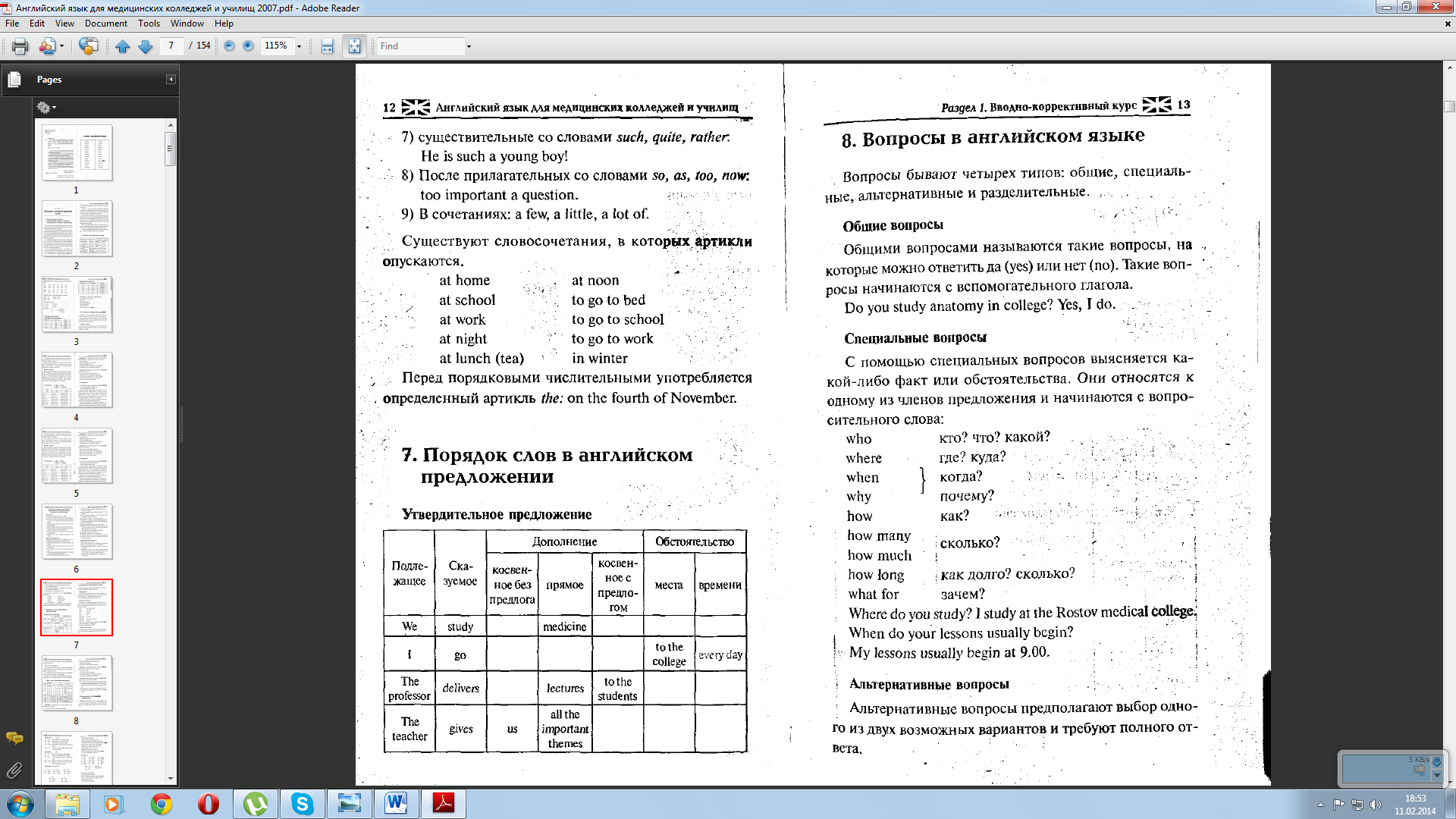
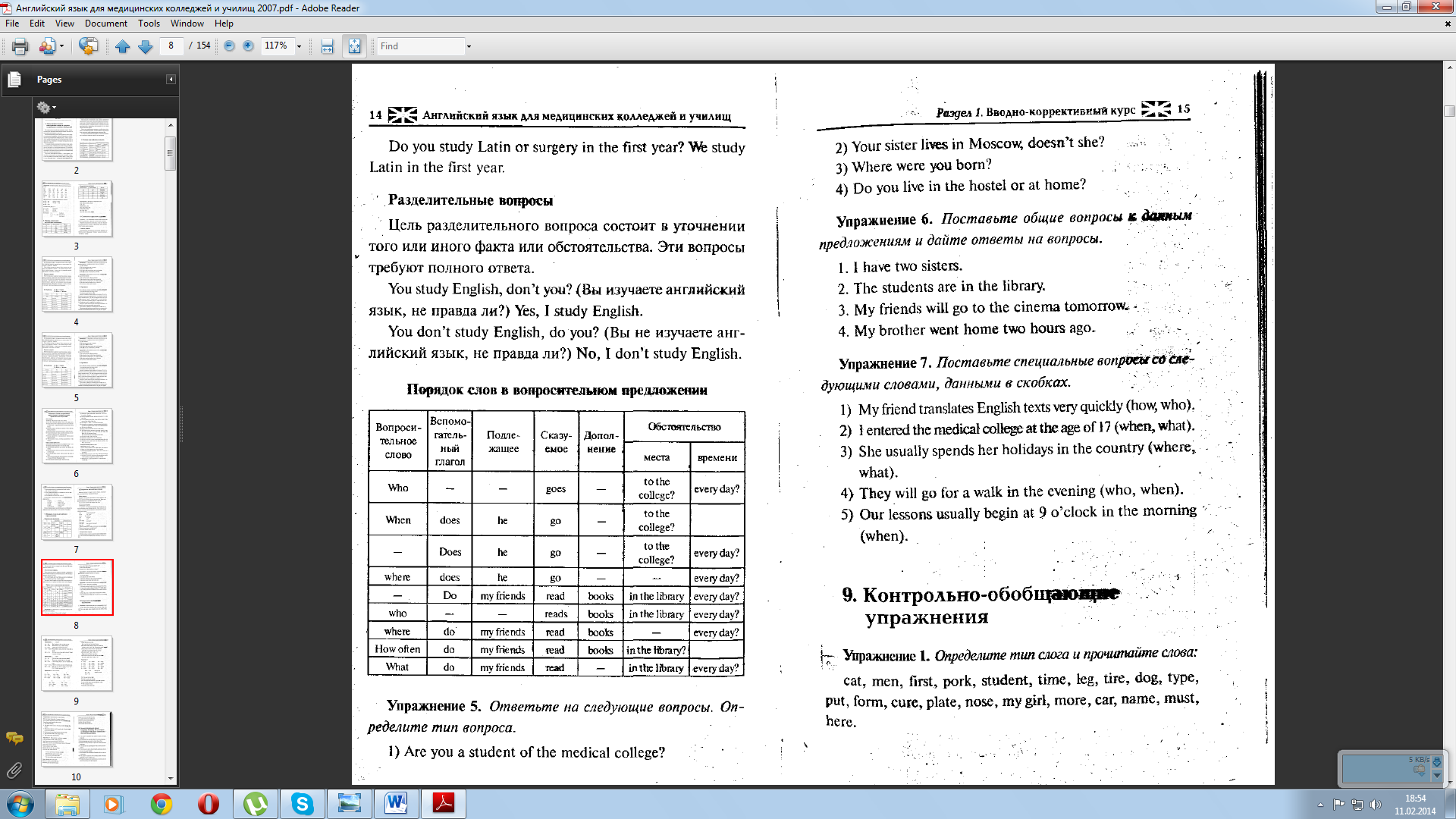
TASKS 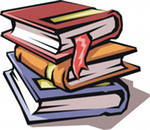
-
Make up the sentences:
1.medications ,many, cure, diseases
2.enters, is absorbed, tablets, into, blood vessels, and, the bloodstream
3.bacterial ,antibiotic. fights, infections
4.are designed, pain ,medicines, to relieve,сertain
5.your, not, be stored, in. bathroom, medicines ,should
-
Put general and special questions:
-
Some medicines are produced in a laboratory.
-
Some drugs replace missing substances or correct abnormally low levels of natural body chemicals.
-
Medicines can help control high blood pressure.
-
Medicines are the most effective treatments available for many illnesses.
-
In each case, doctors can prescribe medicines to replace the missing hormone.
Заключение
Данная методическая разработка предназначена студентам 2 курса медицинских техникумов и колледжей по теме «Основные лекарственные средства».
Основной её целью является развитие лингвострановедческой, социокультурной и коммуникативной компетенций на основе представленных в нем тестов и заданий.
Изучение темы «Основные лекарственные средства» позволяет студентам не только пополнить свой лексический запас, улучшить навыки аудирования, грамматические навыки, навык работы с текстом, но и применить свои знания в жизни, например, при возникновении проблем со здоровьем за границей.
Данный материал предложен для изучения самостоятельно, либо под контролем преподавателя как на аудиторных занятиях, так и внеаудиторно.
Библиографический список
1.Козырева Л.Г. Английский для медицинских колледжей и училищ: учебное пособие. - Ростов н/Д: Феникс, 2011,66-68 с.
2.kidshealth.org/teen/your_body/medical_care/meds.html
3.kidshealth.org/teen/your_body/medical_care/medications-quiz.html
4.learningnurse.org/tests/meds/principles/quiz.html
Приложение 1
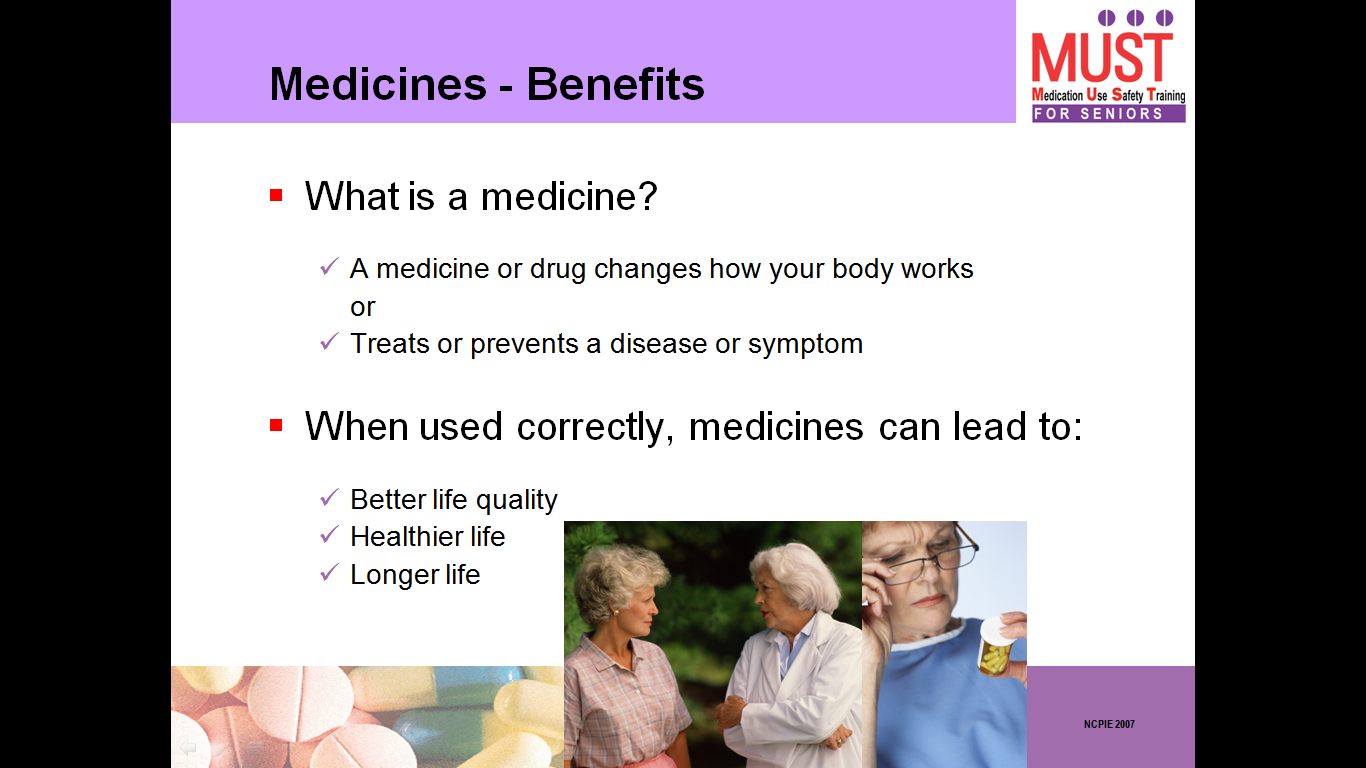
Приложение 2

Приложение 3
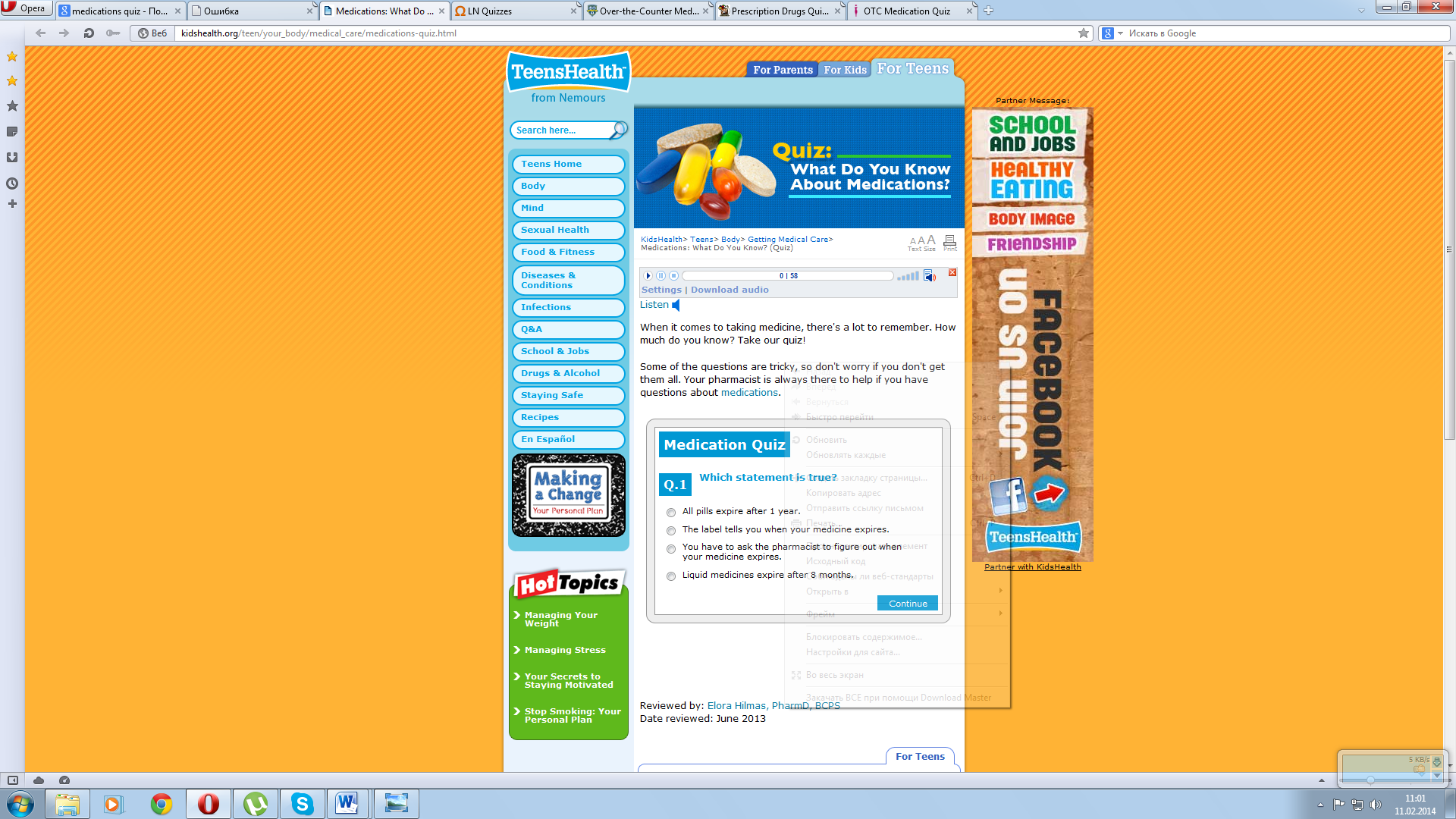
Приложение 4
